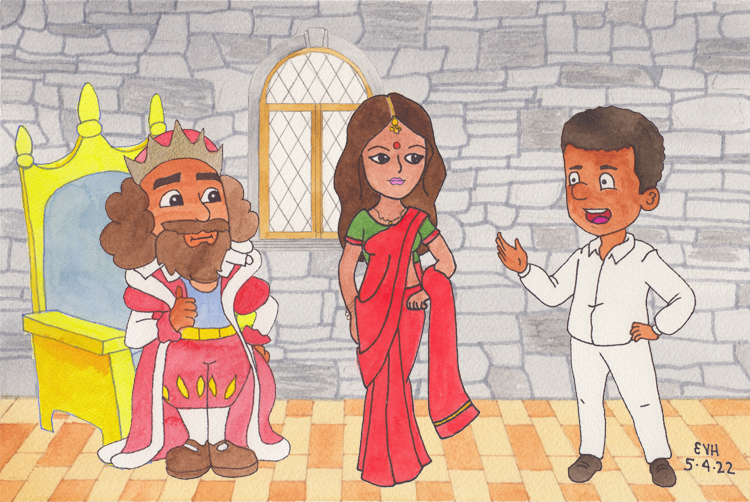
Jataka 333
Godha Jātaka
(Another) Lizard Story
as told by Eric Van Horn
originally translated by H.T. Francis and R.A. Neil, Cambridge University
originally edited by Professor Edward Byles Cowell, Cambridge University
This story is nearly identical to Jātaka 320. It is also basically the same story as Jātaka 223.
“Then were you.” The Master told this story while he was at Jetavana. It is about a certain landowner. The introductory story has been told in full before (Jātaka 320). But in this case, the husband and wife were returning home after calling in a debt. In the course of their journey some hunters gave them a roasted lizard, instructing them to both eat it. The man sent his wife off to fetch water, and while she was gone, he ate the whole lizard. When she came back, he said, “My dear, the lizard ran away.” “Well, my lord,” she said, “what can one do with a roasted lizard that runs away?” She drank some water, and later, at Jetavana, when sitting in the presence of the Master, he asked her, “Lay sister, is this man affectionate, loving and helpful to you?” She answered, “I am loving and affectionate to him, but he has no love for me.” The Master said, “Well, if he does behave in this way to you, do not grieve. When he remembers your virtues, he will give supreme value to you alone.” And at their request, he told them this story from the past.
This old story is just like the one given above, but in this case, as the husband and wife were on their way home, some hunters saw how distressed they were. So they gave them a roasted lizard and told them to share it between them. The royal lady tied it up with a creeper used as a string, and they went on her way with her carrying it in her hand. They came upon a lake, and leaving the high road, they sat down at the foot of a Bodhi tree. The prince said, “Go, my dear and fetch water from the lake in a lotus leaf. Then we will eat this meat.” She hung the lizard on a bough and went to fetch water. While she was gone, her companion ate the entire lizard, and then he sat, holding the tip of the tail in his hand. When she returned with the water, he said, “My dear, the lizard came down from the bough and made for an ant hill. I ran and seized it by the tip of its tail. The lizard broke in two and left the part I had seized in my hand and disappeared down the hole.”
“Well, my lord,” she replied, “how can we deal with a roasted lizard that runs away? Come, let us be off.”
And so, after drinking the water, they journeyed to Benares. When he came to the throne, the prince gave her the ceremonial rank of Queen consort. But no honor or respect was paid to her. The Bodhisatta wished for her to gain honor. One day, he stood in the King’s presence and asked her, “Lady, is it the case that we receive nothing at your hands? Why do you neglect us?”
“Dear sir,” she said, “I get nothing from the King. How then should I give a gift to you? What is the King likely to give me now? When we were coming from the forest, he ate a roast lizard all by himself.”
“Lady,” he said, “the King would not act in this way. Do not speak like this about him.”
Then the lady said to him, “Sir, this is not clear to you, but it is clear enough to the King and me,” and she repeated the first stanza:
Then you were first known to me,
When in forest-depths, O King,
Roasted lizard broke its string
And from Bodhi branch got free.
Though beneath the bark, I glean,
Sword and coat of mail were seen.
So said the Queen, making known the King’s offence in front of his courtiers. The Bodhisatta, on hearing her, said, “Lady, ever since the time when your husband ceased to love you, why do you go on living here, making it uncomfortable for you both?” and he repeated two stanzas:
To one that honors you, due honor show
With full benefit of good service done.
No kindness on miserly folk bestow,
Nor those affect that would your presence shun.
Forsake the wretch who has forsaken thee,
And love not one who has for you no love,
E’en as a bird forsakes a barren tree,
And seeks a home in some far distant grove.

Figure: “To one who honors you, due honor show.”
The King, while the Bodhisatta was speaking, called to mind her virtues and said, “My dear, for ever so long I did not respect your virtues, but through the words of this wise man, I now see them. Forgive my offence. I now give to you this whole realm of mine.” And then he spoke the fourth stanza:
Far as in his power may be,
Gratitude a King should show:
All my realm I grant to thee,
Gifts, on whom you will bestow.
With these words the King gave on the Queen supreme power. And thinking, “It was by this man that I was reminded of her virtues,” he gave great power to the wise man also.
The Master, having brought his lesson to an end, taught the Four Noble Truths, after which both the husband and wife attained the fruition of the First Path (stream-entry). Then he identified the birth: “The husband and wife of the present story played the same part in the story from the past. And I was the wise minister.”
